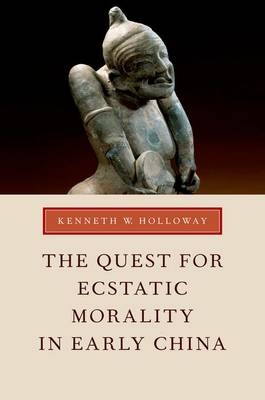
The Quest for Ecstatic Morality in Early China
Seiten
2013
Oxford University Press Inc (Verlag)
978-0-19-994174-2 (ISBN)
Oxford University Press Inc (Verlag)
978-0-19-994174-2 (ISBN)
We are accustomed to the idea that emotions need to be controlled, but the Chinese text "Xing zi mingchu" (300 B.C.E) argues that setting them free allows us to develop our qing. Although the development is completed with the help of the classics, the result is a personal connection to the Dao.
There is an intense love of freedom evident in the "Xing zi mingchu," a text last seen when it was buried in a Chinese tomb in 300 B.C.E. It tells us that both joy and sadness are the ecstatic zenith of what the text terms "qing." Combining emotions into qing allows them to serve as a stepping stone to the Dao, the transcendent source of morality for the world. There is a process one must follow to prepare qing: it must be beautified by learning from the classics written by ancient sages. What is absent from the process is any indication that the emotions themselves need to be suppressed or regulated, as is found in most other texts from this time.
The Confucian principles of humanity and righteousness are not rejected, but they are seen as needing our qing and the Dao. Holloway argues that the Dao here is the same Dao of Laozi's Daode jing. As a missing link between what came to be called Confucianism and Daoism, the "Xing zi mingchu" is changing the way we look at the history of religion in early China.
There is an intense love of freedom evident in the "Xing zi mingchu," a text last seen when it was buried in a Chinese tomb in 300 B.C.E. It tells us that both joy and sadness are the ecstatic zenith of what the text terms "qing." Combining emotions into qing allows them to serve as a stepping stone to the Dao, the transcendent source of morality for the world. There is a process one must follow to prepare qing: it must be beautified by learning from the classics written by ancient sages. What is absent from the process is any indication that the emotions themselves need to be suppressed or regulated, as is found in most other texts from this time.
The Confucian principles of humanity and righteousness are not rejected, but they are seen as needing our qing and the Dao. Holloway argues that the Dao here is the same Dao of Laozi's Daode jing. As a missing link between what came to be called Confucianism and Daoism, the "Xing zi mingchu" is changing the way we look at the history of religion in early China.
Kenneth Holloway is Associate Professor of History and Levenson Professor of Asian Studies at Florida Atlantic University.
Preface ; Introduction ; Chapter 1: Qing, from Conflict to Ecstasy ; Chapter 2: The Role of Nature in a World of Friction ; Chapter 3: Having fun with the Dao ; Chapter 4: Absolute versus relative morality ; Chapter 5: The Rectification of Names ; Appendix ; Notes ; Bibliography
| Verlagsort | New York |
|---|---|
| Sprache | englisch |
| Maße | 234 x 152 mm |
| Gewicht | 227 g |
| Themenwelt | Geschichte ► Teilgebiete der Geschichte ► Religionsgeschichte |
| Geisteswissenschaften ► Philosophie ► Östliche Philosophie | |
| Geisteswissenschaften ► Religion / Theologie ► Weitere Religionen | |
| ISBN-10 | 0-19-994174-2 / 0199941742 |
| ISBN-13 | 978-0-19-994174-2 / 9780199941742 |
| Zustand | Neuware |
| Haben Sie eine Frage zum Produkt? |
Mehr entdecken
aus dem Bereich
aus dem Bereich
Herkunft, Blüte, Weg nach Osten
Buch | Hardcover (2024)
C.H.Beck (Verlag)
39,00 €
Von den Anfängen bis zur Gegenwart
Buch | Hardcover (2022)
C.H.Beck (Verlag)
34,00 €
warum die Religionen erst im Mittelalter entstanden sind
Buch | Hardcover (2024)
C.H.Beck (Verlag)
38,00 €


